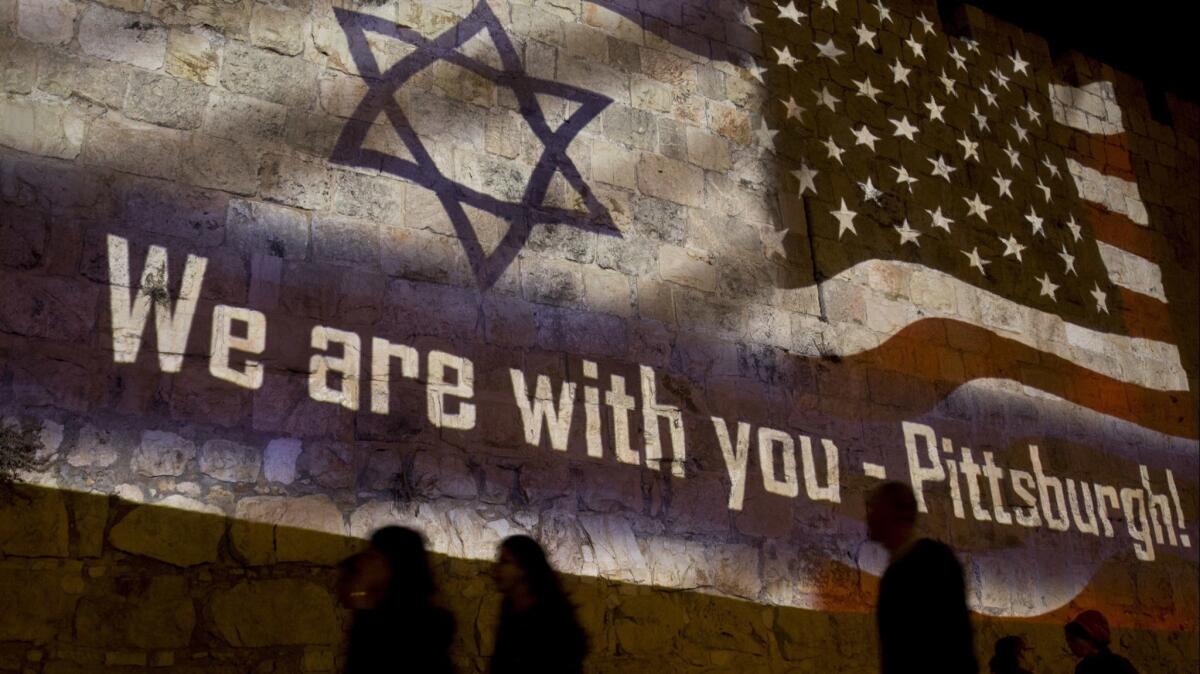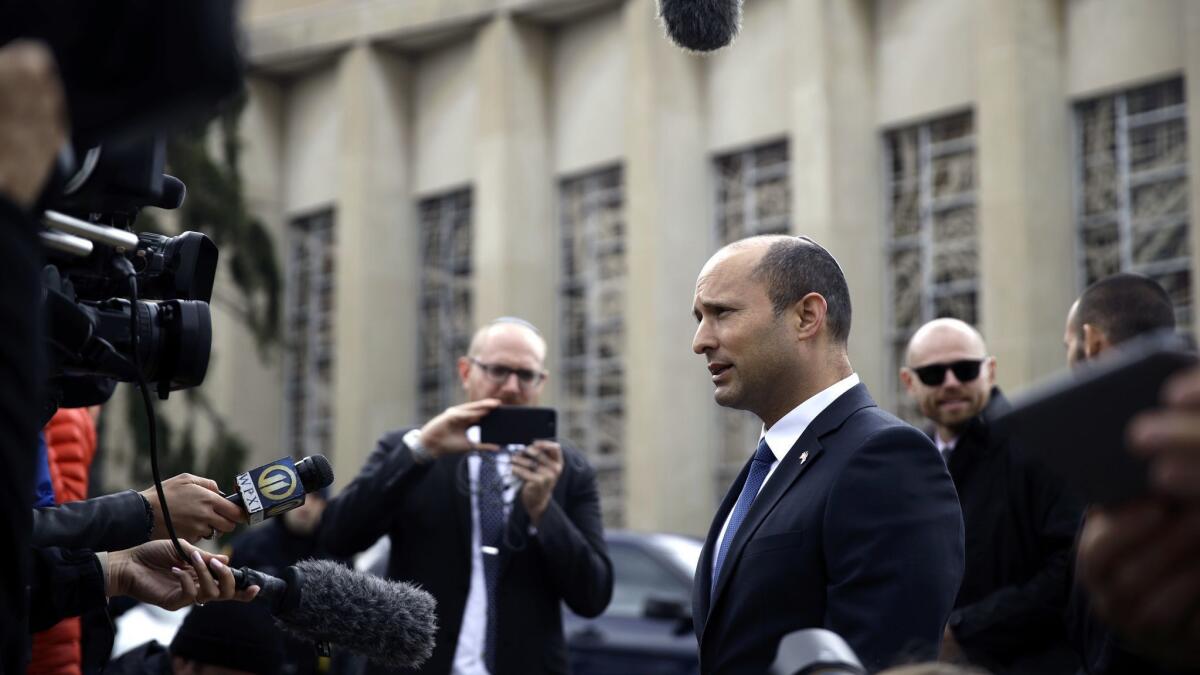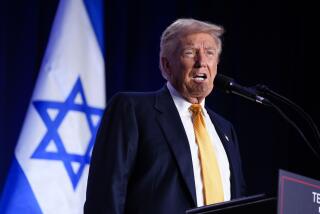Pittsburgh shooting exposes rift in Israel, which doesn’t recognize all Jewish denominations

Reporting from Jerusalem — Saturday’s mass shooting at Pittsburgh’s Tree of Life Synagogue drew widespread expressions of outrage and sympathy from many countries struggling with a surge in anti-Semitic violence.
But in Israel, where Prime Minister Benjamin Netanyahu has said that Israel has a role in the fight against anti-Semitism, no matter where it occurs, official denouncements of the crime quickly devolved into a political squabble that reveals the growing rift between American Jews and the Jewish state.
For the record:
8:50 a.m. Oct. 31, 2018An earlier version of this article referred to Charlottesville, Va., as Charlottesville, N.C.
Pittsburgh’s Tree of Life congregation hosts communities representing three streams of progressive Judaism. Most American Jews with a religious affiliation belong to one of those branches, but none of the denominations is recognized as properly Jewish by Israel’s Orthodox religious authorities. And so the response to the shooting from Israel reflected some ambivalence — not about the victims, but about the Jewishness of the site.
Netanyahu quickly posted a video in which he said he was “heartbroken and appalled by the murderous attack on a Pittsburgh synagogue.”
But David Lau, Israel’s Ashkenazi chief rabbi, who is both a religious authority and a public servant, engaged in linguistic acrobatics so as to avoid referring to the site of the massacre as a synagogue, or Jewish house of worship.
Interviewed by an ultra-Orthodox newspaper, Lau said the victims “were killed because they were Jews … in a place that for the killer was a place of clear Jewish character.”
Lau’s remarks sparked a firestorm, with opposition leaders calling on the government to break a decades-long unwritten agreement with ultra-Orthodox religious parties whereby other denominations of Judaism, principally the Reform and Conservative wings, have no legal standing.
One result of that agreement is that Israel does not recognize the Jewishness of people who converted under the authority of progressive Jewish rabbis — a significant detail since Israel offers citizenship to all Jews. Also, the few Reform and Conservative congregations in Israel don’t qualify for public funding, as do Orthodox congregations, and their rabbis cannot perform officially sanctioned marriages or funerals.
Still, most Israelis were horrified by the shooting, and didn’t parse their grief. Yair Lapid, who hopes to replace Netanyahu as head of the centrist Yesh Atid party, tweeted, “If you are murdered because you are a Jew, then you are a Jew. The Conservative and Reform are our brothers. They are our family.”
As Israel enters an election year, the country is fragmented by doctrinal rifts that seem only to worsen, and the breach between American Jewry and Israeli Jews has never been so acute.
Neither side seems inclined to paper over the gaps: Last week, the annual general assembly of the Jewish Federations of North America, hosted by Tel Aviv, was headlined: “We Need to Talk.”
In one flashpoint in the conflict, Netanyahu last year buckled to ultra-Orthodox threats and broke a historic 2016 agreement brokered with progressive Jewish leaders to expand and upgrade an egalitarian area of the Western Wall plaza, which is run by state religious authorities.
But the differences are not limited to internal Jewish matters.
Netanyahu’s embrace of far-right European leaders who have more than a nodding relationship with anti-Semitism has alienated American Jews and worried even some of his political allies in Israel.
In the last year, Netanyahu has enthusiastically welcomed to Jerusalem fellow right-wingers such as Hungarian Prime Minister Viktor Orban, who campaigned for reelection by defaming the Hungarian-born Jewish American billionaire George Soros, and Philippine President Rodrigo Duterte, who once famously compared himself to Adolf Hitler.
Netanyahu believes alliances with nationalistic leaders will buffer him from Western European criticism of Israel’s treatment of Palestinians.
But no political friendship has proved as provocative or as problematic as the one Netanyahu has nurtured with President Trump, who has low levels of support among American Jews.
A survey released last week by the Mellman Group and the Jewish Electorate Institute found that 23% of American Jews support Trump, and despite some enthusiasm for his pro-Israel policies, 74% plan on voting for his Democratic opponent in 2020 regardless of the candidate.
Despite claims by some American Jews that Trump’s nationalistic and anti-immigrant stances are fueling anti-Semitism in the United States, Israel’s embrace of Trump only strengthened in the aftermath of the Pittsburgh massacre.
In an interview with MSNBC, Israeli Ambassador to the United States Ron Dermer praised the president for his denunciation of anti-Semitism. Asked whether Trump might have emboldened anti-Semites with some of his language — particularly his remarks last year that there were “fine people on both sides” when neo-Nazis marched in Charlottesville, Va. — Dermer said that while he didn’t agree with Trump’s statement, “The people we should blame for anti-Semitism is the anti-Semite.”
He also said: “I see a lot of people on both sides who attack Jews,” he said.
“To simply say that this is because of one person, only comes on one side, is to not understand the history of anti-Semitism or the reality of anti-Semitism,” Dermer said. “One of the big forces in college campuses today is anti-Semitism. And those anti-Semites are usually not neo-Nazis, on college campuses. They’re coming from the radical left.”
Dermer was the first person to greet Trump as he arrived at the Tree of Life Synagogue and he walked him into the building as if welcoming a foreign dignitary to Israel.

As protesters chanted “President hate, leave our state,” Naftali Bennett, Israel’s minister for diaspora affairs, whom Netanyahu dispatched to Pittsburgh in a show of solidarity one day after the massacre, posted a robust defense of Trump that appeared to criticize local Jews.
“President Trump is a true friend of the state of Israel and to the Jewish people,” Bennett declared, adding that criticism of him was “unfair and wrong.”
Bennett exemplifies the head-turning complexity of Israel’s reactions to the massacre in Pittsburgh.
He leads the ultra-nationalist Jewish Home party, and is also a Netanyahu rival gearing up for elections in 2019. His base consists of religious supporters of Israeli West Bank settlements, who do not generally consider progressive Jews properly Jewish.
With that in mind, Bennett on Sunday issued a carefully worded statement about “the shooting incident against the Jewish community in Pittsburgh,” avoiding the word “synagogue.”
After two days in Pittsburgh, and as the controversy in Israel expanded, Bennett acknowledged in an interview with The Times that “this was a brutal murder of Jews because they were Jews in a synagogue.”
Tarnopolsky is a special correspondent.
UPDATES:
Oct. 31, 2 p.m.: This article was updated to provide additional context for Dermer’s comments to MSNBC.
This article was originally published at 7:05 p.m, Oct. 30.
More to Read
Sign up for Essential California
The most important California stories and recommendations in your inbox every morning.
You may occasionally receive promotional content from the Los Angeles Times.










